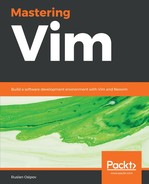Building doesn't necessarily apply to Python (since there isn't much compiling going on), but it's definitely worth going over to understand how Vim deals with executing code.
Vim provides a :make command, which wraps around the Unix make utility. In case you're not familiar, Make is a build management solution as old as time (and if it ain't broke...) that allows you to recompile parts of a bigger program (or all of it) as needed.
Some relevant options you'd want to be aware of are as follows:
- :compiler lets you specify a different compiler plugin, which also modifies the expected format output for the compiler
- In particular, :set errorformat defines a set of recognized error formats
- :set makeprg sets what program to execute when running :make
The two can be used in conjunction to work with any compiler. For example, if you wanted to compile a C file you're working on, you could invoke gcc (standard issue C compiler) by running the following:
:compiler gcc
:make
What makes :make important is that it allows Vim users to implement syntax checkers, test runners, or just about anything else that spits out references to lines as a compiler plugin, giving us access to quickfix or location windows!
Terminal mode, introduced in Vim 8.1, is also a solid candidate for long-running builds, as :term make will call make asynchronously while you continue working on your code. See the Terminal mode section for more about terminal mode.
